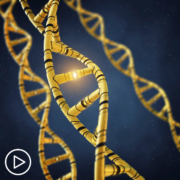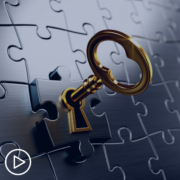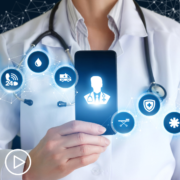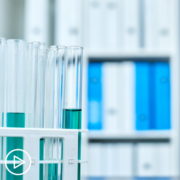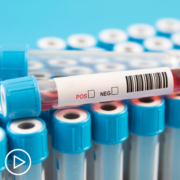IGHV-Mutated vs IGHV-Unmutated CLL | What’s the Difference?
IGHV-Mutated vs IGHV-Unmutated CLL | What’s the Difference? from Patient Empowerment Network on Vimeo.
What’s the difference between chronic lymphocytic leukemia (CLL) that’s IGHV-mutated versus IGHV-unmutated? Expert Dr. Ryan Jacobs explains tests involved in CLL diagnosis and treatment options.
Dr. Ryan Jacobs is a hematologist/oncologist specializing in Chronic Lymphocytic Leukemia from Levine Cancer Institute. Learn more about Dr. Jacobs.
Download Resource Guide | Descargar Guía en Español
Related Programs:
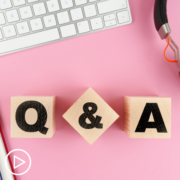
|

|
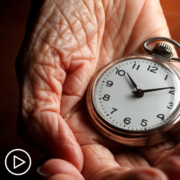
|
Transcript:
Lisa Hatfield:
“What is the difference between IGHV-mutated and IGHV-unmutated CLL? And can you talk about treatment considerations for those?”
Dr. Ryan Jacobs:
Yeah. So that’s part of a bigger discussion around the prognostic work-up of CLL and not all CLL is the same, and we’ve done a really good job of figuring out tests to separate out the CLL patients that tend to behave more aggressively and respond to certain kind of therapies, versus those that are more of what we call indolent or slow growing and respond to other kinds of therapies. I do want to say, I haven’t mentioned it yet, we still don’t treat CLL if it’s not causing any problems. And about half of patients get diagnosed as sort of an accident and they get a blood test for something else and their white count is elevated, and that leads to a diagnosis, but they feel fine. We still leave those patients alone. Even with these good treatment options we have, we recognize that there are a select percentage of CLL patients that don’t ever need treatment, and so we don’t just want to start treatment in everybody. But I do still like to check this prognostic work-up, even if I’m not going to start treatment, but I make sure and ask the patient if that’s what…in line with what they want.
But certainly, if you’re going to start treatment, you’re required by guidelines to check a prognostic work-up, and I would really encourage the CLL patients tuning in to ask their oncologist, “What is my prognostic work-up?” if they’re going to start treatment. Because of the oncologists, unfortunately that have to deal with lots of other cancers, maybe don’t always know the right test to send. I’m very spoiled in that I get to just treat lymphoma and specifically focus a lot of my research in CLL and get to stay up with all this. I don’t know how a general oncologist keeps up with everything, honestly.
But the big three tests are going to be the FISH analysis, fluorescence in situ hybridization. And then IGHV mutational analysis, and then also a TP53 mutation analysis. And I don’t really have time to go through all of those, but IGHV is the question I get a lot. “What is that?” It’s one of these rare findings where it’s actually normal to have a mutation at the IGHV. IGHV stands for immune globulin heavy chain variable region, and it is usually mutated in B lymphocytes because it’s part of the process of a mature lymphocyte that is able to make a lot of different kinds of antibodies. And it undergoes somatic hypermutation, is what it’s called, as the B cell matures.
Generally in oncology, the more mature a cancer is, the less aggressive it behaves and usually the easier it is to manage, and that is the case with CLL. So think of an unmutated IGHV CLL cancer as a more primitive or a more immature cancer clone, and as such, it is harder to treat. In about half of patients will be found to be unmuted at the IGHV and historically, all we had was chemo and we knew these patients weren’t going to respond for nearly as long as the IGHV-mutated patients were to chemo. What’s nice is, with our targeted treatments, particularly the long-term data with the BTK inhibitors, it doesn’t look like it matters whether you’re mutated or you’re unmutated. So that’s one of the really great things with our new treatments for CLL, is it has, the people that have benefited the most are the ones that were doing the worst, so that’s great. It’s not just the patients that were already doing well, that are doing even better.

